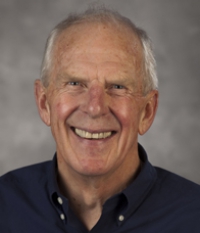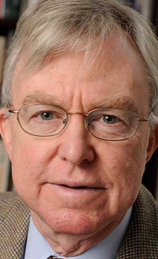Article first published online: May 12, 2015
Robert Haveman, Professor Emeritus of Economics and Public Affairs and Research Associate at the Institute for Research on Poverty, La Follette School of Public Affairs, Adjunct Professor of Economics at University of Melbourne (AU).
Rebecca M. Blank, Chancellor of the University of Wisconsin-Madison, Professor, La Follette School of Public Affairs and the Department of Economics
Robert A Moffitt, Department Chair, Krieger-Eisenhower Professor of Economics, Johns Hopkins University
Timothy Smeeding, Arts and Sciences Distinguished Professor of Public Affairs and Economics, La Follette School of Public Affairs, University of Wisconsin-Madison
Geoffrey Wallace, Associate Professor of Public Affairs and Economics, Faculty Affiliate, Institute for Research on Poverty, La Follette School of Public Affairs, University of Wisconsin-Madison
What was the genesis of the idea for your research/paper?
This year is the 50th Anniversary of the start of the War on Poverty. Ken Couch suggested that JPAM would be interested in a retrospective paper looking back on both policy changes and policy analysis developments.
What is the main conclusion that becomes evident from your research? (Or, what is your main takeaway?)
Over this half-century, the initial heavy reliance on cash income support to poor families has eroded; increases in public support came largely in the form of in-kind (e.g., Food Stamps) and tax-related (e.g., the Earned Income Tax Credit) benefits. Work support and the supplementation of earnings substituted for direct support, and this shift eroded the safety net for the most disadvantaged in American society.”
What are some of the more interesting or surprising findings/conclusions did you find in the process of bringing this together?
I was surprised that these policy shifts proceeded so systematically over time, reflecting the political waters at the time. I was also surprised by the persistent and very large increase in the percent of the nation’s personal income that was devoted to providing social benefits over the half-century. That percentage increased from 6 percent to 17 percent. Finally, it struck me how important the procedures for measuring poverty are in assessing the overall trend in poverty—use of the Official Measure suggests little or any progress against poverty; use of the Supplemental measure which is far superior in concept indicates some real progress in fighting poverty.
Click here to view article
Authors' Bio

Robert Haveman is Professor Emeritus of Economics and Public Affairs and Research Associate at the Institute for Research on Poverty. He is also Adjunct Professor of Economics at University of Melbourne (AU).
Professor Haveman has served as Senior Economist, Subcommittee on Economy in Government, Joint Economic Committee, U.S. Congress. He was a Fellow at the Russell Sage Foundation in 1991-92, Research Associate at Resources for the Future in 1964-65 and 1999-1970, Fulbright Siena Professor in 2003, and Fellow at the Netherlands Institute of Advanced Study in 1975–76, 1996–97, 1996-97, and 2007. His work has appeared in the American Economic Review, Review of Economics and Statistics, Quarterly Journal of Economics, and Journal of the American Statistical Association.
Projects include estimating the adequacy of savings of older workers at and during retirement, assessing the impact of health shocks on the assets of retirees, evaluating the impacts of the Section 8 housing voucher program, and analyzing the methods for assessing the employment effects of public policy measures. He is an award-winning teacher, who continues to teach at the La Follette School, of which he was Director from 1988 to 1991. He was Director of the Institute for Research on Poverty from 1971 to 1975, and Chair of the Department of Economics from 1993-1996.He received his doctorate in economics from Vanderbilt University.

Rebecca M. Blank became the Chancellor of the University of Wisconsin-Madison in July 2013. She is tenured at the La Follette School of Public Affairs and the Department of Economics.
An expert in social policy and poverty issues, Blank spent four years in top positions of the U.S. Department of Commerce prior to becoming Chancellor, including service as Commerce's Deputy Secretary and (for more than a year) as Acting Secretary.
From 1999 to 2008, Blank served as Dean and Professor of public policy and economics in the Gerald R. Ford School of Public Policy at the University of Michigan. She was also a Fellow at the Brookings Institution, a Washington, DC think tank, before joining the Department of Commerce.
She was a member of the faculty of Northwestern University and Princeton University. From 1997 to 1999, she was a member of the President's Council of Economic Advisers. Blank holds an undergraduate degree from the University of Minnesota and a doctoral degree from the Massachusetts Institute of Technology — both in economics.

Robert A Moffitt's research interests are in the areas of labor economics and applied micro econometrics. A large portion of his research in labor economics has concerned the labor supply decisions of female heads of family and its response to the U.S. welfare system. His research on the welfare system has led to publications on the AFDC, Food Stamp, and Medicaid programs.
He has also published research on the labor supply effects of social insurance programs, including Social Security, unemployment insurance, and disability insurance, as well as of the U.S. income tax system. Other papers have concerned the pattern of real wages over the business cycle, volatility in the U.S. labor market; and trends in U.S. earnings inequality, labor mobility, and state government decision-making.
Part of his research also focuses on population economics and economic demography, where he has estimated economic models of marriage, cohabitation, female headship, and fertility. His methodological research has led to publications on selection bias and limited-dependent variable models, nonlinear budget constraints, panel data, attrition, duration models, and causal modeling and program evaluation.

Timothy Smeeding is the Arts and Sciences Distinguished Professor of Public Affairs and Economics. He was Director of the Institute for Research on Poverty from 2008–2014. Professor Smeeding's publications include From Parents to Children, co-edited with John Ermicsch and Markus Jantti (Russell Sage Foundation, 2012); The Handbook of Economic Inequality, co-edited with Brian Nolan and Weimer Salverda (Oxford University Press, April 2009); Poor Kids in a Rich Country: America's Children in Comparative Perspective, co-authored with Lee Rainwater (Russell Sage Foundation, 2003); The Future of the Family, co-edited by Daniel Patrick Moynihan and Lee Rainwater (Russell Sage Foundation, 2004; paperback ed., 2006); The American Welfare State: Laggard or Leader? with Irv Garfinkel and Lee Rainwater (Oxford University Press, February 2010).
In 2011 he published two edited volumes, Young Disadvantaged Men: Fathers, Families, Poverty, and Policy, with Irv Garfinkel and Ron Mincy (ANNALS Volume 635, May 2011), and Persistence, Privilege and Parenting: The Comparative Study of Intergenerational Mobility, with Robert Erikson and Markus Jantti (Russell Sage Foundation, 2011).
His recent work has been on low-income men and their role as fathers; mobility across generations; and inequality of income consumption and wealth, and the measurement of poverty in a national and cross-national context.

Geoffrey Wallace is Associate Professor of Public Affairs and Economics. His research is in labor economics, the economics of marriage and the family, and policy issues relating to poverty. Current projects examine the effects of changing economic conditions on living arrangements among young people, the effects of competition on educational outcomes, and issues of child support enforcement. His research on educational outcomes includes a study of the effects of Milwaukee's public school choice program on student achievement. Professor Wallace received his doctorate in economics from Northwestern University.